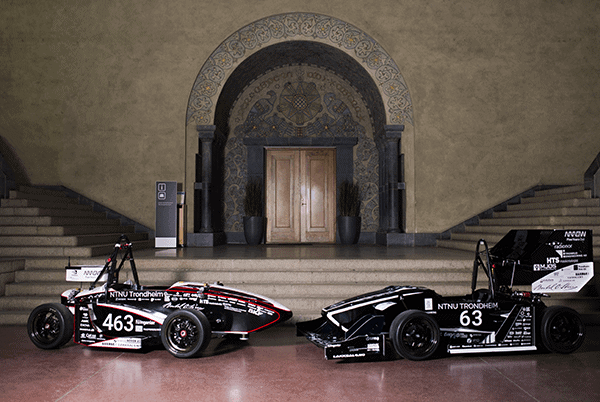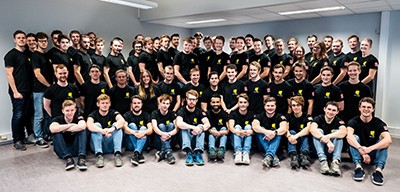For several years Percepio has been sponsoring Formula Student Racing Car teams with Tracealyzer licenses. We caught up with three of them and thought we’d share their ambitions, thoughts, and of course their experiences with Tracealyzer. Here is the second team.
Revolve, NTNU Trondheim, Norway
Team size: about 65 students
Revolve electric cars (click on 2018 to see Atmos)
We spoke to Viktor Korsnes, Group Leader Embedded Electronics for Revolve.
– Why build an electric car?
There are many reasons. After making two combustion vehicles in 2012 and 2013 we made our first electric car in 2014. Our values are dedication, ambition and innovative, and creating Norway’s first electric race car is definitely ambitious. We also designed our own motor controller, and the only way to make such a big change in one year is dedication. I believe what drives our organization towards these changes is a passion for always pushing the current technology to the limit, and once that is reached, move into new uncharted regions for that extra performance.
Last year we started building a driverless vehicle as well.
– Can you say anything about the challenges?
With every technological advance, it brings different challenges. This year our self-developed motor controller is a major challenge. Both hardware and software. We have also implemented a new platform for our vehicle control unit (VCU), where we’ve earlier used a MCU, we are now using a SoC with two MCUs and a FPGA module. Reliability is also an issue, as minor bugs can be the difference between a valid run and a disqualification.
– What would you say is your team’s strength?
The greatest assets of our team is our team members. They are a dedicated gang who absolutely loves what they are doing. We also have many active alumnis both in the team and outside. They have tried to do the exact same thing we are doing this year, namely to produce a race car in less than a year. They have a lot of knowledge and experience.
Next are our partners, this project would never be possible without their help. They are a part of the team, they help us explore new concepts and improve our design. We can’t really thank our sponsors enough. Percepio has saved us a lot of time while debugging, and having to wade our way through lines and lines of code.
– Will you engage in the Formula Student competition 2018/19?
We have not decided which contest to participate in yet, the only one we know for sure is Formula Student Germany. FSG is the biggest and most prestigious of them all. By landing a second place overall in the last competition we are already qualified for it. Our goal is top 5 overall.
– Software and MCU platform(s)?
We use ATSAMV70N21 for most of our cards. On our motor control card we use two of them and a Intel MAX 10 FPGA for parsing the encoder measurements. For the Vehicle Control Unit we use a Zynq 7000. Lastly we use a Raspberry Pi to interface with our telemetry system. All our circuit boards except the Pi are self-developed, and we write all the application code ourselves. We also use FreeRTOS.
– How do you intend to use Tracealyzer?
Some of the things last year’s team used Tracealyzer for:
- See how the different tasks were interacting and load capacity.
- See the impact of increasing the frequency of certain tasks.
- Debug delay in CAN drivers.
- Statistics on how some algorithm performed.
- See run time of every task.
All of this is very valuable data for making design decision for this year, like upping the VCU hardware.
For this year we want to continue measuring run times and create documentation of how the software on the different circuit boards perform. I think visualizing the code makes it much easier to understand. Making everyone on the group comfortable debugging with it will save a lot of time in the autumn and summer.
If you are studying or teaching embedded development, you too may be able to use Tracealyzer for free. You are welcome to check out our Academic Licenses (scroll to bottom of page).


